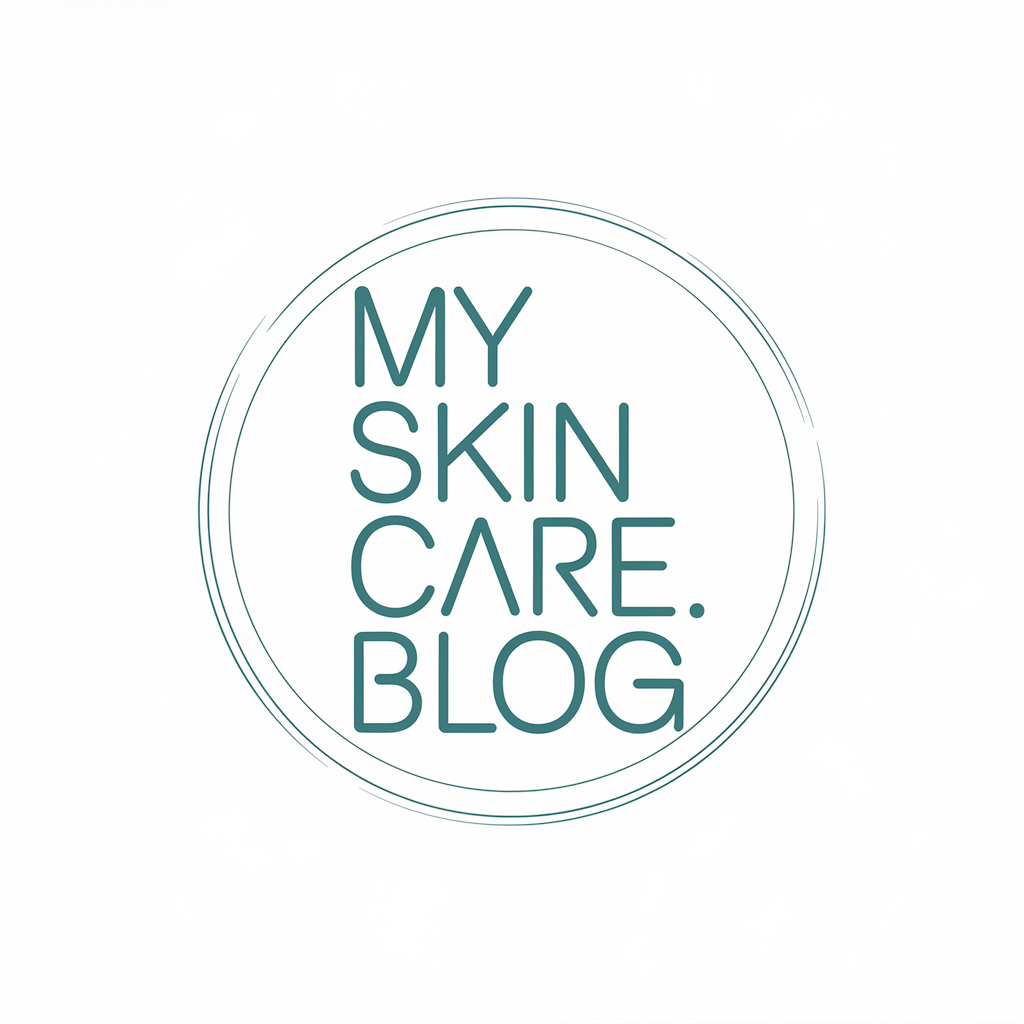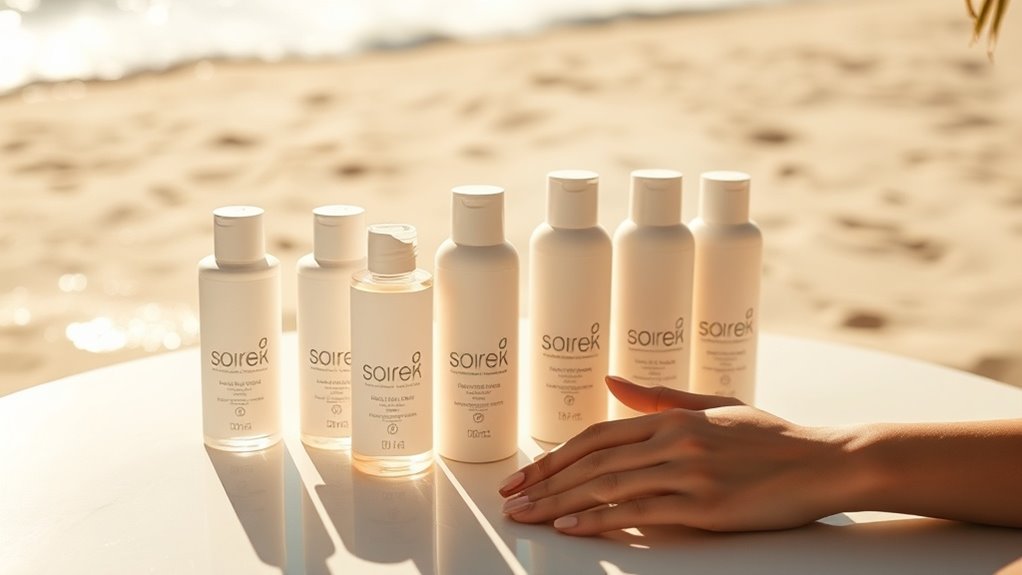The Link Between Stress and Breakouts Is Real-Here’s What to Do
Stress directly links to your breakouts by spiking cortisol, which inflames your skin and boosts oil production, making acne worse. You’ll feel better by trying simple breathing exercises like 4-7-8 to lower cortisol quickly, adding Omega-3 foods such as salmon to reduce inflammation, and incorporating daily walks for mood boosts. Pair this with a gentle skincare routine using SPF for protection. Applying these steps will ease your symptoms, and more effective tips await.
Key Takeaways
- Stress increases cortisol levels, leading to inflammation and breakouts.
- Practice daily breathing exercises, like 4-7-8, to reduce stress and calm skin.
- Eat Omega-3 rich foods, such as salmon, to lower inflammation and support skin health.
- Engage in regular exercise, like walking, to release endorphins and decrease cortisol.
- Use a gentle skincare routine with non-comedogenic products and consult a dermatologist for advice.
Understanding the Stress-Skin Connection
When you’re under stress, your body releases hormones like cortisol, which can trigger inflammation and excess oil production, leading to breakouts.
Research confirms that chronic stress disrupts your skin’s natural balance, making it more vulnerable to issues like acne and sensitivity.
To address this, you actively manage stress through techniques such as deep breathing or yoga, which studies show can lower cortisol and enhance skin resilience.
Prioritize these habits daily; evidence indicates they foster healthier skin by reducing inflammation and supporting recovery, keeping your complexion clearer overall. Moreover, incorporating overnight treatments into your routine can offer immediate solutions for stress-related skin issues, helping to restore your skin’s appearance by morning.
Furthermore, integrating skincare solutions as part of your routine can help counteract the hormonal effects of stress and promote long-term skin health.
How Stress Hormones Affect Your Skin
Stress hormones like cortisol don’t just affect your mood—they actively disrupt your skin’s balance by increasing inflammation and oil production, which can clog pores and trigger breakouts.
Elevated cortisol levels stimulate your sebaceous glands, causing excess oil that fosters bacterial growth and exacerbates acne. This inflammation weakens your skin’s protective barrier, heightening sensitivity and delaying healing.
Research indicates that chronic stress prolongs these effects, potentially worsening conditions like eczema.
To address this, prioritize stress management strategies, such as regular exercise or mindfulness, which lower cortisol and promote skin recovery, helping you maintain a healthier complexion. Furthermore, being mindful of dairy products in your diet can exacerbate acne when combined with stress.
In addition, being aware of everyday habits that contribute to acne can enhance your overall skin health by addressing overlooked triggers.
Identifying Stress-Related Breakouts
Recognizing stress-related breakouts involves spotting patterns that link your skin’s reactions to emotional triggers. You can identify these by tracking when breakouts appear, such as after deadlines or arguments, as research links stress to increased cortisol levels that inflame pores and boost oil production. In managing these breakouts, it’s essential to adopt gentle skincare routines to prevent over-cleansing and further skin barrier damage.
Keep a daily journal noting your stress intensity, breakout locations, and severity—common signs include sudden acne on the forehead or chin. If patterns emerge, like consistent flare-ups during high-anxiety periods, consult a dermatologist for evidence-based analysis.
This proactive tracking empowers you to distinguish stress-related issues from other factors, setting the stage for targeted solutions.
To enhance your approach, consider incorporating proven topical solutions from dermatologist-backed overnight acne treatments for faster management of stress-induced breakouts.
Simple Breathing Exercises for Stress Relief
While stress can exacerbate breakouts, you’ll find that simple breathing exercises offer a proven way to calm your nervous system and lower cortisol levels. Research from the American Psychological Association shows these techniques reduce stress hormones, improving skin health when practiced regularly. Start with short daily sessions to see benefits quickly.
Incorporate them into your routine for actionable relief. Below is a table summarizing five exercises and their steps:
| Exercise | Steps |
|---|---|
| 4-7-8 Breathing | Inhale for 4 seconds, hold for 7, exhale for 8 |
| Box Breathing | Inhale for 4 seconds, hold for 4, exhale for 4, hold for 4 |
| Diaphragmatic Breathing | Inhale deeply into belly for 4 seconds, exhale slowly for 4 |
| Alternate Nostril | Close one nostril, inhale, switch, exhale through other |
| Pursed Lip Breathing | Inhale through nose, exhale slowly through pursed lips |
Incorporating Mindfulness Practices Daily
You can integrate daily breathing exercises into your routine to lower stress levels, as studies confirm they effectively calm the nervous system and reduce skin inflammation.
Build a mindful morning routine by starting your day with focused awareness, such as mindful eating or walking, to enhance your emotional resilience.
End with an evening reflection technique, where you jot down three positive events from your day, helping you process stressors and improve overall well-being.
Additionally, enhancing sleep quality can help counteract the effects of stress on your skin, as it plays a key role in preventing skin aging.
Furthermore, adequate sleep helps mitigate dark circles associated with sleep deprivation.
Daily Breathing Exercises
As stress often exacerbates breakouts, incorporating daily breathing exercises with mindfulness practices offers a proven way to manage both.
Evidence from studies, like those in the Journal of Alternative and Complementary Medicine, shows these techniques lower cortisol, reducing stress-induced inflammation.
You can start simple: practice diaphragmatic breathing twice daily—inhale deeply through your nose for four counts, hold for four, then exhale slowly for four.
Focus on your breath to stay present, letting thoughts pass without judgment.
Track your sessions; consistency builds resilience, leading to clearer skin and better stress control over time.
Mindful Morning Routine
Establishing a mindful morning routine sets the tone for your day’s stress management and skin health by weaving in simple mindfulness practices.
Research from dermatology and psychology shows that these routines lower cortisol levels, reducing inflammation and breakouts, while fostering resilience.
-
Start with 5-10 minutes of meditation, focusing on your breath to calm your mind and minimize stress hormones.
-
Write down three things you’re grateful for, boosting your mood and emotional balance to combat daily pressures.
-
Incorporate gentle yoga or stretching, promoting relaxation and better blood flow for healthier skin.
Evening Reflection Technique
Evening reflection techniques help you unwind from daily stresses by integrating simple mindfulness practices, such as journaling or guided meditation, into your routine. Studies show these methods reduce cortisol levels, easing breakouts linked to stress. To start, set aside 10-15 minutes before bed: journal your thoughts, then meditate to clear your mind. This routine improves sleep and skin health.
| Mindfulness Practice | Benefits |
|---|---|
| Journaling | Processes emotions, reducing anxiety |
| Guided Meditation | Enhances relaxation, lowers stress hormones |
| Breathing Exercises | Calms the nervous system, promoting clearer skin |
Incorporate this nightly for noticeable results.
Nutrition Tips to Combat Stress and Breakouts
You can tackle stress and breakouts by adding omega-3 rich foods like salmon and walnuts to your meals, as studies show they reduce inflammation and boost mood.
Build an antioxidant-packed diet with berries and leafy greens, which helps neutralize free radicals and supports skin health. Meanwhile, avoid processed sugars that can worsen breakouts and inflammation, as they contribute to skin damage according to research.
Take action today by planning meals that include these nutrients for noticeable improvements.
Additionally, embrace specific food modifications from personal journeys to witness long-term enhancements in your skin’s complexion.
Omega-3 Rich Foods
While Omega-3 rich foods help reduce inflammation linked to stress and breakouts, they’re essential for maintaining mental balance and clear skin. Evidence shows these fatty acids lower cortisol levels and support skin health, making them a key tool for you to manage daily stress effectively.
-
Incorporate fatty fish**** like salmon into your meals twice weekly; it’s backed by research for reducing inflammation and boosting mood.
-
Add plant-based sources such as flaxseeds to smoothies or salads; studies confirm they enhance mental clarity and skin barrier function.
-
Snack on walnuts daily for a quick Omega-3 hit; this actionable habit helps combat stress responses and promotes clearer complexion.
Antioxidant Packed Diet
Antioxidants bolster your body’s defense against oxidative stress, which fuels both stress responses and skin breakouts.
To combat this, load your plate with antioxidant-rich foods like berries, leafy greens, and nuts, which research links to reduced inflammation and better skin health.
For instance, aim for a daily serving of blueberries or spinach to neutralize free radicals that exacerbate stress.
Make it simple: whip up a salad with kale and almonds for lunch, or blend a berry smoothie for breakfast.
You’ll actively lower oxidative damage, promoting clearer skin and calmer days.
Stay consistent for results.
Physical Activity for Stress Reduction
Engaging in regular physical activity offers a proven way to combat stress, as research shows it triggers endorphin release and improves mood. Moreover, integrating lifestyle changes can help prevent common skincare pitfalls that affect skin health.
You’ll reduce cortisol levels and enhance well-being by incorporating exercise into your daily life, backed by studies linking it to better stress management and indirect skin benefits.
-
Go for a brisk 30-minute walk daily; it lowers cortisol and clears your mind for immediate relief.
-
Try yoga or Pilates sessions twice a week; these practices boost endorphins and promote deep relaxation.
-
Join group fitness classes or sports; you’ll build social connections while alleviating stress through fun, shared activities.
Additionally, regular physical activity supports anti-aging strategies that help maintain radiant skin and combat signs of aging.
Skincare Routines to Support Stressed Skin
Stress impacts your skin by increasing inflammation and oil production, which can lead to breakouts.
But you can counteract this with a simple, evidence-based routine.
Begin with a gentle, pH-balanced cleanser to remove excess oil without disrupting your skin barrier, as studies show this reduces irritation.
Apply a non-comedogenic moisturizer with ceramides and hyaluronic acid to restore hydration and minimize inflammation.
Incorporate targeted treatments like niacinamide or salicylic acid, which research confirms help control oil and calm redness.
Always use broad-spectrum SPF 30+ sunscreen to protect against UV-induced stress.
Track your routine’s effects for adjustments.
Long-Term Strategies for Stress Management
While short-term tactics can ease immediate stress, adopting long-term strategies builds resilience and supports your skin’s health over time. These methods foster lasting well-being, reducing chronic inflammation that triggers breakouts.
-
Incorporate regular exercise****: Studies show activities like brisk walking lower cortisol levels, enhancing skin barrier function and minimizing acne flare-ups.
-
Practice daily mindfulness****: Research on meditation indicates it reduces anxiety, helping regulate stress hormones for clearer, more balanced skin.
-
Prioritize healthy habits: Evidence links a nutrient-rich diet and consistent sleep to decreased inflammation, preventing stress-related breakouts over time.





